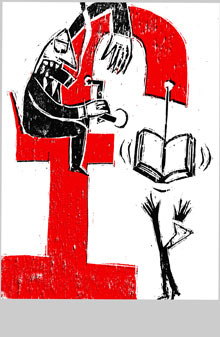'People will forgive you for being wrong, but they will never forgive you for being right - especially if events prove you right while proving them wrong.' Thomas Sowell
Search This Blog
Friday, 30 July 2021
Saturday, 17 April 2021
The Straw Man and The Great Indian Kitchen
By Girish Menon
In the introduction to his book ‘How to win every argument’ Madsen Pirie writes:
Sound reasoning is the basis of winning an argument. Logical fallacies undermine arguments…Many of the fallacies are committed by people genuinely ignorant of logical reasoning, the nature of evidence or what counts as relevant material. Others however might be committed by persons bent on deception. If there is insufficient force behind the argument and the evidence, fallacies can add enough weight to carry them through.
The Malayalam film The Great Indian Kitchen is one such exercise in fallacious reasoning. The film maker sets up and destroys a Straw Man in the form of some highly conservative Sabarimala devotees who are male, upper caste and Hindu. In such households, the film argues, the women are perennially confined to the kitchen and subject to male whims. Some women have bought into the system while the female protagonist and her mother-in-law take up the feminist cause of subversion and rebellion.
A Straw Man, Pirie writes, is a misrepresentation of your opponent’s position, created by you for the express purpose of being knocked down. This is usually done by over-stating an opponent’s position. If your opponent will not make himself an extremist, you can oblige with a Straw Man.
The Straw Man is fallacious because he says nothing about the real argument. Its function is to elicit, by the ease of his demolition, a scorn which can be directed at the real figure he represents.
This writer carried out a straw poll (not representative at all!) among those who supported the filmmaker’s thesis and not one of them stated that they were aware of such instances happening to people known to them. Instead, most of them pointed their fingers to North Kerala where apparently such practices are rife. I did ask a former resident of North Kerala if such things happened there and his response was that ‘Women everywhere were the same North or any part of Kerala’.
Some feminists I know took up cudgels on behalf of the female protagonist even though their own life experiences did not match the film’s heroine. They quoted some sisters who were treated badly by their husbands, but added that these husbands also wanted to live of their wife's earnings. However, they were not willing to question the failure of the female protagonist, who is depicted as educated and modern, to carry out due diligence before entering into the marital contract.
In this writer’s view, the creation and destruction of the Straw Man is the only protest available to progressives and feminists. Because, despite the Supreme Court’s progressive decision in the Sabarimala case, even the progressive left government has declared its inability to implement reforms to Sabarimala rituals. This is because the majority opinion which includes many Hindu women want to maintain the status quo and are unconvinced by the feminist rhetoric.
Saturday, 6 June 2020
Scientific or Pseudo Knowledge? How Lancet's reputation was destroyed

The Lancet is one of the oldest and most respected medical journals in the world. Recently, they published an article on Covid patients receiving hydroxychloroquine with a dire conclusion: the drug increases heartbeat irregularities and decreases hospital survival rates. This result was treated as authoritative, and major drug trials were immediately halted – because why treat anyone with an unsafe drug?
Now, that Lancet study has been retracted, withdrawn from the literature entirely, at the request of three of its authors who “can no longer vouch for the veracity of the primary data sources”. Given the seriousness of the topic and the consequences of the paper, this is one of the most consequential retractions in modern history.
---
It is natural to ask how this is possible. How did a paper of such consequence get discarded like a used tissue by some of its authors only days after publication? If the authors don’t trust it now, how did it get published in the first place?
The answer is quite simple. It happened because peer review, the formal process of reviewing scientific work before it is accepted for publication, is not designed to detect anomalous data. It makes no difference if the anomalies are due to inaccuracies, miscalculations, or outright fraud. This is not what peer review is for. While it is the internationally recognised badge of “settled science”, its value is far more complicated.
At its best, peer review is a slow and careful evaluation of new research by appropriate experts. It involves multiple rounds of revision that removes errors, strengthens analyses, and noticeably improves manuscripts.
At its worst, it is merely window dressing that gives the unwarranted appearance of authority, a cursory process which confers no real value, enforces orthodoxy, and overlooks both obvious analytical problems and outright fraud entirely.
Regardless of how any individual paper is reviewed – and the experience is usually somewhere between the above extremes – the sad truth is peer review in its entirety is struggling, and retractions like this drag its flaws into an incredibly bright spotlight.
The ballistics of this problem are well known. To start with, peer review is entirely unrewarded. The internal currency of science consists entirely of producing new papers, which form the cornerstone of your scientific reputation. There is no emphasis on reviewing the work of others. If you spend several days in a continuous back-and-forth technical exchange with authors, trying to improve their manuscript, adding new analyses, shoring up conclusions, no one will ever know your name. Neither are you paid. Peer review originally fitted under an amorphous idea of academic “service” – the tasks that scientists were supposed to perform as members of their community. This is a nice idea, but is almost invariably maintained by researchers with excellent job security. Some senior scientists are notorious for peer reviewing manuscripts rarely or even never – because it interferes with the task of producing more of their own research.
However, even if reliable volunteers for peer review can be found, it is increasingly clear that it is insufficient. The vast majority of peer-reviewed articles are never checked for any form of analytical consistency, nor can they be – journals do not require manuscripts to have accompanying data or analytical code and often will not help you obtain them from authors if you wish to see them. Authors usually have zero formal, moral, or legal requirements to share the data and analytical methods behind their experiments. Finally, if you locate a problem in a published paper and bring it to either of these parties, often the median response is no response at all – silence.
This is usually not because authors or editors are negligent or uncaring. Usually, it is because they are trying to keep up with the component difficulties of keeping their scientific careers and journals respectively afloat. Unfortunately, those goals are directly in opposition – authors publishing as much as possible means back-breaking amounts of submissions for journals. Increasingly time-poor researchers, busy with their own publications, often decline invitations to review. Subsequently, peer review is then cursory or non-analytical.
And even still, we often muddle through. Until we encounter extraordinary circumstances.

Peer review during a pandemic faces a brutal dilemma – the moral importance of releasing important information with planetary consequences quickly, versus the scientific importance of evaluating the presented work fully – while trying to recruit scientists, already busier than usual due to their disrupted lives, to review work for free. And, after this process is complete, publications face immediate scrutiny by a much larger group of engaged scientific readers than usual, who treat publications which affect the health of every living human being with the scrutiny they deserve.
The consequences are extreme. The consequences for any of us, on discovering a persistent cough and respiratory difficulties, are directly determined by this research. Papers like today’s retraction determine how people live or die tomorrow. They affect what drugs are recommended, what treatments are available, and how we get them sooner.
The immediate solution to this problem of extreme opacity, which allows flawed papers to hide in plain sight, has been advocated for years: require more transparency, mandate more scrutiny. Prioritise publishing papers which present data and analytical code alongside a manuscript. Re-analyse papers for their accuracy before publication, instead of just assessing their potential importance. Engage expert statistical reviewers where necessary, pay them if you must. Be immediately responsive to criticism, and enforce this same standard on authors. The alternative is more retractions, more missteps, more wasted time, more loss of public trust … and more death.
Sunday, 29 April 2018
Fake five-star reviews being bought and sold online
Fake online reviews are being openly traded on the internet, a BBC investigation has found.
BBC 5 live Investigates was able to buy a false, five-star recommendation placed on one of the world's leading review websites, Trustpilot.
It also uncovered online forums where Amazon shoppers are offered full refunds in exchange for product reviews.
Both companies said they do not tolerate false reviews.
'Trying to game the system'
The popularity of online review sites mean they are increasingly relied on by both businesses and their customers, with the government's Competition and Markets Authority estimating such reviews potentially influence £23 billion of UK customer spending every year.
Maria Menelaou, whose Yorkshire Fisheries chip shop is the top-ranked fish and chip shop in Blackpool on several review sites, said the system has replaced traditional advertising.
"It brings us a lot of customers ... It really does make a difference. We don't do any kind of advertising," Mrs Menelaou said.
While three quarters of UK adults use online review websites, almost half of those believe they have seen fake reviews, according to a survey of 1500 UK residents conducted by the Chartered Institute of Marketing and shared with BBC 5 live Investigates.
Some US analysts estimate as many as half of the reviews for certain products posted on international websites such as Amazon are potentially unreliable.
"Sellers are trying to game the system and there's a lot of money on the table," said Tommy Noonan, who runs ReviewMeta, a US-based website that analyses online reviews.
"If you can rank number one for, say, bluetooth headsets and you're selling a cheap product, you can make a lot of money," he said.

'5 star is better for us'
Mr Noonan said this effectively drove the problem underground, leading to the emergence of Facebook groups where potential Amazon customers were encouraged to buy a product and post a review in return for a full refund.
BBC 5 live Investigates identified several of these groups and, within minutes of joining, was approached with offers of full refunds on products bought on Amazon in exchange for positive reviews.
"5 star is better for us" said one person making such an offer, in an exchange of messages with the BBC. "We value our brand, will refund you as we promised ... All my company do in this way."
It was not possible to identify the people making these offers, nor contact the businesses whose products they were seeking reviews for.
"We do not permit reviews in exchange for compensation of any kind, including payment. Customers and Marketplace sellers must follow our review guidelines and those that don't will be subject to action including potential termination of their account," Amazon said in a statement.
Responding to adverts posted on eBay, the BBC was also able to purchase a false 5-star review on Trustpilot, an online review website that describes itself as "committed to being the most trusted online review community on the market".
"Dan Box is one of the most respected professionals I have dealt with. It was a pleasure doing business with him," this review said - word for word as requested by 5 live Investigates.
Trustpilot, whose platform allows anyone to post a review, said they have "a zero-tolerance policy towards any misuse".
"We have specialist software that screens reviews against 100's of data points around the clock to automatically identify and remove fakes," the company said.
In a statement, eBay said the sale of such reviews is banned from its platform "and any listings will be removed".
Saturday, 22 October 2016
So much for scientific publications: Nonsense paper written by iOS autocomplete accepted for conference
A nonsensical academic paper on nuclear physics written only by iOS autocomplete has been accepted for a scientific conference.
Christoph Bartneck, an associate professor at the Human Interface Technology laboratory at the University of Canterbury in New Zealand, received an email inviting him to submit a paper to the International Conference on Atomic and Nuclear Physics in the US in November.
“Since I have practically no knowledge of nuclear physics I resorted to iOS autocomplete function to help me writing the paper,” he wrote in a blog post on Thursday. “I started a sentence with ‘atomic’ or ‘nuclear’ and then randomly hit the autocomplete suggestions.
“The atoms of a better universe will have the right for the same as you are the way we shall have to be a great place for a great time to enjoy the day you are a wonderful person to your great time to take the fun and take a great time and enjoy the great day you will be a wonderful time for your parents and kids,” is a sample sentence from the abstract.
It concludes: “Power is not a great place for a good time.”
Bartneck illustrated the paper – titled, again through autocorrect, “Atomic Energy will have been made available to a single source” – with the first graphic on the Wikipedia entry for nuclear physics.
He submitted it under a fake identity: associate professor Iris Pear of the US, whose experience in atomic and nuclear physics was outlined in a biography using contradictory gender pronouns.
The nonsensical paper was accepted only three hours later, in an email asking Bartneck to confirm his slot for the “oral presentation” at the international conference.
“I know that iOS is a pretty good software, but reaching tenure has never been this close,” Bartneck commented in the blog post.
He did not have to pay money to submit the paper, but the acceptance letter referred him to register for the conference at a cost of US$1099 (also able to be paid in euros or pounds) as an academic speaker.
“I did not complete this step since my university would certainly object to me wasting money this way,” Bartneck told Guardian Australia. “... My impression is that this is not a particularly good conference.”
The International Conference on Atomic and Nuclear Physics will be held on 17-18 November in Atlanta, Georgia, and is organised by ConferenceSeries: “an amalgamation of Open Access Publications and worldwide international science conferences and events”, established in 2007.
An organiser has been contacted by Guardian Australia for comment.
Bartneck said that given the quality of the review process and the steep registration fee, he was “reasonably certain that this is a money-making conference with little to no commitment to science.
“I did not yet reply to their email, but I am tempted to ask them about the reviewers’ comments. That might be a funny one.”
The conference’s call for abstracts makes only a little more sense than Bartneck’s paper.
“Nuclear and sub-atomic material science it the investigation of the properties, flow and collaborations of the essential (however not major) building pieces of matter.”
A bogus research paper reading only “Get me off Your Fucking Mailing List” repeated over and over again was accepted by the International Journal of Advanced Computer Technology, an open-access academic journal, in November 2014.
Tuesday, 27 January 2015
BCCI monopoly and judicial review
Suhrith Parthasarathy in The Hindu
By controlling competitive cricket in India, with minimal regulation, the Board of Control for Cricket in India has enabled itself to encroach upon constitutionally guaranteed civil liberties
Sunday, 6 October 2013
How I bought drugs from 'dark net' – it's just like Amazon run by cartels

Sunday, 27 January 2013
Take the DRS out of the players' hands
Tuesday, 30 August 2011
Academic publishers make Murdoch look like a socialist

 Illustration by Daniel Pudles
Of course, you could go into the library (if it still exists). But they too have been hit by cosmic fees. The average cost of an annual subscription to a chemistry journal is $3,792. Some journals cost $10,000 a year or more to stock. The most expensive I've seen, Elsevier's Biochimica et Biophysica Acta, is $20,930. Though academic libraries have been frantically cutting subscriptions to make ends meet, journals now consume 65% of their budgets, which means they have had to reduce the number of books they buy. Journal fees account for a significant component of universities' costs, which are being passed to their students.
Murdoch pays his journalists and editors, and his companies generate much of the content they use. But the academic publishers get their articles, their peer reviewing (vetting by other researchers) and even much of their editing for free. The material they publish was commissioned and funded not by them but by us, through government research grants and academic stipends. But to see it, we must pay again, and through the nose.
The returns are astronomical: in the past financial year, for example, Elsevier's operating profit margin was 36% (£724m on revenues of £2bn). They result from a stranglehold on the market. Elsevier, Springer and Wiley, who have bought up many of their competitors, now publish 42% of journal articles.
More importantly, universities are locked into buying their products. Academic papers are published in only one place, and they have to be read by researchers trying to keep up with their subject. Demand is inelastic and competition non-existent, because different journals can't publish the same material. In many cases the publishers oblige the libraries to buy a large package of journals, whether or not they want them all. Perhaps it's not surprising that one of the biggest crooks ever to have preyed upon the people of this country – Robert Maxwell – made much of his money through academic publishing.
The publishers claim that they have to charge these fees as a result of the costs of production and distribution, and that they add value (in Springer's words) because they "develop journal brands and maintain and improve the digital infrastructure which has revolutionised scientific communication in the past 15 years". But an analysis by Deutsche Bank reaches different conclusions. "We believe the publisher adds relatively little value to the publishing process … if the process really were as complex, costly and value-added as the publishers protest that it is, 40% margins wouldn't be available." Far from assisting the dissemination of research, the big publishers impede it, as their long turnaround times can delay the release of findings by a year or more.
What we see here is pure rentier capitalism: monopolising a public resource then charging exorbitant fees to use it. Another term for it is economic parasitism. To obtain the knowledge for which we have already paid, we must surrender our feu to the lairds of learning.
It's bad enough for academics, it's worse for the laity. I refer readers to peer-reviewed papers, on the principle that claims should be followed to their sources. The readers tell me that they can't afford to judge for themselves whether or not I have represented the research fairly. Independent researchers who try to inform themselves about important scientific issues have to fork out thousands. This is a tax on education, a stifling of the public mind. It appears to contravene the universal declaration of human rights, which says that "everyone has the right freely to … share in scientific advancement and its benefits".
Open-access publishing, despite its promise, and some excellent resources such as the Public Library of Science and the physics database arxiv.org, has failed to displace the monopolists. In 1998 the Economist, surveying the opportunities offered by electronic publishing, predicted that "the days of 40% profit margins may soon be as dead as Robert Maxwell". But in 2010 Elsevier's operating profit margins were the same (36%) as they were in 1998.
The reason is that the big publishers have rounded up the journals with the highest academic impact factors, in which publication is essential for researchers trying to secure grants and advance their careers. You can start reading open-access journals, but you can't stop reading the closed ones.
Government bodies, with a few exceptions, have failed to confront them. The National Institutes of Health in the US oblige anyone taking their grants to put their papers in an open-access archive. But Research Councils UK, whose statement on public access is a masterpiece of meaningless waffle, relies on "the assumption that publishers will maintain the spirit of their current policies". You bet they will.
In the short term, governments should refer the academic publishers to their competition watchdogs, and insist that all papers arising from publicly funded research are placed in a free public database. In the longer term, they should work with researchers to cut out the middleman altogether, creating – along the lines proposed by Björn Brembs of Berlin's Freie Universität – a single global archive of academic literature and data. Peer-review would be overseen by an independent body. It could be funded by the library budgets which are currently being diverted into the hands of privateers.
The knowledge monopoly is as unwarranted and anachronistic as the corn laws. Let's throw off these parasitic overlords and liberate the research that belongs to us.
• A fully referenced version of this article can be found on George Monbiot's website. On Twitter, @georgemonbiot
Illustration by Daniel Pudles
Of course, you could go into the library (if it still exists). But they too have been hit by cosmic fees. The average cost of an annual subscription to a chemistry journal is $3,792. Some journals cost $10,000 a year or more to stock. The most expensive I've seen, Elsevier's Biochimica et Biophysica Acta, is $20,930. Though academic libraries have been frantically cutting subscriptions to make ends meet, journals now consume 65% of their budgets, which means they have had to reduce the number of books they buy. Journal fees account for a significant component of universities' costs, which are being passed to their students.
Murdoch pays his journalists and editors, and his companies generate much of the content they use. But the academic publishers get their articles, their peer reviewing (vetting by other researchers) and even much of their editing for free. The material they publish was commissioned and funded not by them but by us, through government research grants and academic stipends. But to see it, we must pay again, and through the nose.
The returns are astronomical: in the past financial year, for example, Elsevier's operating profit margin was 36% (£724m on revenues of £2bn). They result from a stranglehold on the market. Elsevier, Springer and Wiley, who have bought up many of their competitors, now publish 42% of journal articles.
More importantly, universities are locked into buying their products. Academic papers are published in only one place, and they have to be read by researchers trying to keep up with their subject. Demand is inelastic and competition non-existent, because different journals can't publish the same material. In many cases the publishers oblige the libraries to buy a large package of journals, whether or not they want them all. Perhaps it's not surprising that one of the biggest crooks ever to have preyed upon the people of this country – Robert Maxwell – made much of his money through academic publishing.
The publishers claim that they have to charge these fees as a result of the costs of production and distribution, and that they add value (in Springer's words) because they "develop journal brands and maintain and improve the digital infrastructure which has revolutionised scientific communication in the past 15 years". But an analysis by Deutsche Bank reaches different conclusions. "We believe the publisher adds relatively little value to the publishing process … if the process really were as complex, costly and value-added as the publishers protest that it is, 40% margins wouldn't be available." Far from assisting the dissemination of research, the big publishers impede it, as their long turnaround times can delay the release of findings by a year or more.
What we see here is pure rentier capitalism: monopolising a public resource then charging exorbitant fees to use it. Another term for it is economic parasitism. To obtain the knowledge for which we have already paid, we must surrender our feu to the lairds of learning.
It's bad enough for academics, it's worse for the laity. I refer readers to peer-reviewed papers, on the principle that claims should be followed to their sources. The readers tell me that they can't afford to judge for themselves whether or not I have represented the research fairly. Independent researchers who try to inform themselves about important scientific issues have to fork out thousands. This is a tax on education, a stifling of the public mind. It appears to contravene the universal declaration of human rights, which says that "everyone has the right freely to … share in scientific advancement and its benefits".
Open-access publishing, despite its promise, and some excellent resources such as the Public Library of Science and the physics database arxiv.org, has failed to displace the monopolists. In 1998 the Economist, surveying the opportunities offered by electronic publishing, predicted that "the days of 40% profit margins may soon be as dead as Robert Maxwell". But in 2010 Elsevier's operating profit margins were the same (36%) as they were in 1998.
The reason is that the big publishers have rounded up the journals with the highest academic impact factors, in which publication is essential for researchers trying to secure grants and advance their careers. You can start reading open-access journals, but you can't stop reading the closed ones.
Government bodies, with a few exceptions, have failed to confront them. The National Institutes of Health in the US oblige anyone taking their grants to put their papers in an open-access archive. But Research Councils UK, whose statement on public access is a masterpiece of meaningless waffle, relies on "the assumption that publishers will maintain the spirit of their current policies". You bet they will.
In the short term, governments should refer the academic publishers to their competition watchdogs, and insist that all papers arising from publicly funded research are placed in a free public database. In the longer term, they should work with researchers to cut out the middleman altogether, creating – along the lines proposed by Björn Brembs of Berlin's Freie Universität – a single global archive of academic literature and data. Peer-review would be overseen by an independent body. It could be funded by the library budgets which are currently being diverted into the hands of privateers.
The knowledge monopoly is as unwarranted and anachronistic as the corn laws. Let's throw off these parasitic overlords and liberate the research that belongs to us.
• A fully referenced version of this article can be found on George Monbiot's website. On Twitter, @georgemonbiot
- © 2011 Guardian News and Media Limited or its affiliated companies. All rights reserved.

